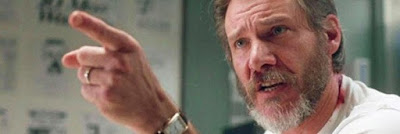The Fugitive: Applying Jim Hull's Universe Lesson Universally
 |
| "This overall story is not in Activity! And oh, I didn't kill my wife!" |
Jim Hull's recent article about the Overall Story Domain of The Fugitive in Situation (or to use the more accurate term, Universe) made me realize something crucial about my own story. Which is funny, because my Overall Story is in Manipulation/Psychology!
Toward the end of the article Jim says this:
The resolution of the Overall Story Throughline brings an end to the inequity motivating conflict within a story. In the case of The Fugitive, apprehension of Dr. Kimball or his eventual permanent escape would fail to return equity. The unjust label of wife-murderer would continue to persist.Those counter-examples really struck a chord with me. I have to admit that in the past I was sometimes confused by The Fugitive being in Situation. But it's so clear that the movie would have been unsatisfying if it tried to resolve things with Obtaining -- apprehending Kimble or having him escape permanently -- so that the Activities of trying to recapture him stopped. It's not those activities that are the source of difficulties, but the "bad Universe" that exists in which Kimble is labelled as having murdered his wife. That Universe is stuck in a bad state and needs to be put right.
Jim's article reminded me that Dramatica gives us powerful, objective tools. One of those tools is that we can apply what we know about a story's resolution to help understand the true source of conflict in the story. And this objective way of looking at narrative applies universally, so that I am able to apply the lesson on the Universe domain to my story despite its different domain. (It also gave me a nice pun for my blog post title!)
Applying Jim's Lesson To My Own Work
So how exactly is that helping me with my own story?Well, as I've been furiously churning out my first draft (furious for me is two thousand words on a good day), I've hit upon a sequence in the second act that's confused me because it's gone on much longer than I expected.
In my story's First Act Turn*, Becca (the Influence Character) has her Unworlded Sensor go off, which forces her alien-controlled professor to abduct her, and this forces Devin (the Main Character) to try to rescue Becca when he hears her groaning behind a door in the professor's office.
It's not as silly as it sounds. I promise.
Anyway, the sequence giving me trouble is the fallout from that First Act Turn. The good-guys, galactic freedom-fighters in the guise of a country club, are debriefing (more like interrogating) Devin and Becca about what happened. It's been fun to write, the words have been flowing well, and I've even had a cool new character pop up out of nowhere. Yet it feels strange to me how much I'm focusing on this particular stuff, conflict between all the "good-guys" -- not trusting each other, keeping secrets, lying, tricking, etc.
Of course I knew with the OS in Manipulation there would be a lot of that, but I didn't expect so much between the so-called good-guys!
Jim's article made me realize something important. What this sequence is doing is demonstrating that there is a kind of sickness running through the story, a "bad psychology" in which even the good-guys aren't thinking properly. This story's problems cannot be solved simply by catching the badguys, or finding the lost starfighter, or destroying the incoming alien ship/fleet**.
The Story Goal is Becoming, something like becoming Earth's defenders. So this sequence is showing how the good-guys really do need to change their nature in order to resolve the story's inequity and become the heroes the Earth needs. What could be more fundamental in a story than demonstrating why the Goal is important?
With this understanding, I’ve been able to
put aside my doubts about this sequence and keep pushing through my first
draft. I can always address things in revision, but I needed to make sure
the story was fundamentally going in the right direction. By confirming that, Dramatica (with help from Narrative First) has once again given me that little bit of extra confidence I need to keep
going – something every writer can use!
_________
* Also sometimes called the Second Story Driver, this is the Action or Decision that turns the story from Act 1 to Act 2 (out of 4 Acts). My story's Driver is Action, so actions always force decisions.
** I still can't decide how many incoming ships there are. Just one, or a whole fleet? Dramatica can't tell you everything!



Comments
Post a Comment
Comments will be reviewed before being published.